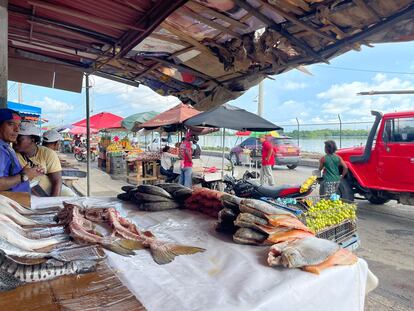Two Dutch tourists die of possible food poisoning in baffling Cartagena mystery
Colombian authorities have released little information about the events that set everyone on edge in the historic Caribbean seaport


The young woman lay lifeless on the hospital gurney. Her partner, a man of the same age, would die a few hours later. The doctors who treated them were instructed to sanitize themselves well. “We don’t know what we’re dealing with,” said the head physician. The August deaths of the two Dutch vacationers in their 30s remains a mystery. Both earned good salaries — one at JP Morgan, the other at Procter & Gamble — and shared a sense of adventure. Colombian authorities have not released the autopsy results and have not offered any explanations for their deaths. Nienke Bawa, who liked interior design, and Bob Kootte, a financier with slicked-back hair, are gone and no one know why.
Speculation is rampant in this Caribbean city, Colombia’s number one tourist destination, but the authorities have said little to dispel anxiety about the unexplained deaths. Online publication Traveling Lifestyle noted the deaths of the Dutch tourists in an article, “Is it safe to travel to Colombia right now?”
“They [the Dutch tourists] didn’t come here. And even if they did, everyone else ate the same food. So why did only two die? I’ve asked God and the Virgin Mary to tell me what happened,” said Edilma Marimón, who has been serving food in Cartagena’s Bazurto market for more than 40 years. The market is a maze of stalls with fresh fish and other food on display, producing an overwhelming combination of aromas. She says there are fewer customers once word got around that the two Dutch tourists visited the market the day before they died. Authorities have retraced the steps of Bawa and Kootte, and are focusing on three places they visited. The market is one of them, but they are also scrutinizing The Rum Box restaurant, owned by the son of Cartagena’s mayor. Shortly after the deaths were revealed, several hotheads stood outside the restaurant shouting “murderers” at the staff.
Nienke Bawa made the dinner reservation for two at The Rum Box, and then sent a last-minute WhatsApp message changing the reservation to four diners for a table on the second floor. The restaurant owner, Abraham Dau, says their meal began at 8:30 pm with several shared appetizers and six cocktails. Bob ordered fish, while Nienke ordered a pork dish. The other couple ordered fish.
The restaurant’s security cameras recorded the entire dinner, as well as their departure at 11:10 pm. Bob, tall and blond, walks calmly out of the restaurant with his hands clasped behind his back. They all say goodbye to the staff as they walk out the door, and then chat for a moment out on the street. They disappear around a corner, perhaps heading for the historic city center.
“The biggest mystery is that the other couple disappeared,” says the cab driver as looks at me in the rearview mirror. No one seems to know anything about this other couple. Some rumors say they were located and interviewed by investigators on Baru Island, south of Cartagena, but local prosecutors and police will neither confirm nor deny this. There is an uncomfortable veil of secrecy about everything surrounding the case. “I’m not authorized to speak [about the case],” said one of the investigators apologetically.

The next day Bawa and Kootte show symptoms of poisoning, and spend the day in their room at the Casa del Coliseo hotel, the third location under scrutiny by investigators. The boutique hotel is a tastefully restored mansion with large, stately rooms and balconies overlooking the bustling streets of downtown Cartagena. There’s a rooftop swimming pool sheltered from view. No one wants to talk about the deaths at the hotel, and there only a few guests having breakfast. A lawyer for the hotel issued a statement saying that the investigation at the hotel “did not yield any clues as to the cause of death.” The statement also notes that the hotel only serves a standard breakfast, and no other guests reported any problems.
The couple got sicker as the day went on, and were transferred in the late afternoon to the Medihelp clinic. Bawa died that night, and Kootte died the next morning. An investigation was launched, and the bodies were repatriated a few days later.
The investigators first went to The Rum Box. They checked the food and beverages, and took samples. They analyzed the security camera videos and requested to see invoices from all of the restaurant’s suppliers. Abraham Dau does not understand why the investigation is taking so long, and says that it has affected his business, although every table on the second floor was occupied when we visited. “We were mortified,” said Dau, who insists that no one got sick from the many meals they served that night. He believes that some of the accusations against his restaurant are politically motivated because he’s the mayor’s son. “I’m an introvert and this experience has been traumatic. I’m used to being criticized, but I built this business with my own sweat and blood.”
Nothing much has changed for the three places at the center of the police investigation. The restaurant was only closed on the first day so as not to hinder the investigation. There is nothing but serene silence at the hotel. And in the market, vendors are still selling lobsters stacked high on trays and rice from huge pots, although any mention of “the Dutch couple” causes a stir.
Gina Marimón adamantly says that no one has ever gotten sick from eating at their place, and threatens to retaliate if anyone accuses them of anything. “We’re going organize a protest march and demand that the other couple appear in public to tell everyone what the two dead ones ate.”
Tu suscripción se está usando en otro dispositivo
¿Quieres añadir otro usuario a tu suscripción?
Si continúas leyendo en este dispositivo, no se podrá leer en el otro.
FlechaTu suscripción se está usando en otro dispositivo y solo puedes acceder a EL PAÍS desde un dispositivo a la vez.
Si quieres compartir tu cuenta, cambia tu suscripción a la modalidad Premium, así podrás añadir otro usuario. Cada uno accederá con su propia cuenta de email, lo que os permitirá personalizar vuestra experiencia en EL PAÍS.
¿Tienes una suscripción de empresa? Accede aquí para contratar más cuentas.
En el caso de no saber quién está usando tu cuenta, te recomendamos cambiar tu contraseña aquí.
Si decides continuar compartiendo tu cuenta, este mensaje se mostrará en tu dispositivo y en el de la otra persona que está usando tu cuenta de forma indefinida, afectando a tu experiencia de lectura. Puedes consultar aquí los términos y condiciones de la suscripción digital.








































